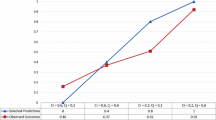Abstract
We report the results of experiments that test for behavioral differences between volunteer subjects recruited in the usual way and pseudo-volunteer subjects in experiments conducted during class time. In a series of dictator games, we find that psuedo-volunteers are more generous on average than their volunteer counterparts, and that non-monetary factors such as religious or altruistic preferences have a greater effect on the giving behavior of pseudo-volunteers.
Similar content being viewed by others
References
Andreoni, J. and Miller, J.H. (1998). “Giving According to GARP: An Experimental Study of Rationality and Altruism.” Unpublished manuscript, University of Wisconsin-Madison.
Andreoni, J. and Vesterlund, L. (forthcoming). “Which is the Fair Sex? Gender Differences in Altruism.” Quarterly Journal of Economics.
Camerer, C.F. and Hogarth, R.M. (1999). “The Effects of Financial Incentives in Experiments: A Review and Capit-labor-Production Framework.” Journal of Risk and Uncertainty. 19(103), 7–42.
Clotfelter, C.T. (1980). “Tax Incentives and Charitable Giving: Evidence from a Panel of Taxpayers.” Journal of Public Economics, 13, 319–340.
Clotfelter, C.T. (1989). “The Impact of Tax Reform on Charitable Giving: A 1989 perspective.” In J. Slemrod (ed.), Do Taxes Matter: The Impact of the Tax Reform Act of 1986. Cambridge, MA: MIT Press.
Eckel, C.C. and Grossman, P.J. (1996). “Altruism in Anonymous Dictator Games.” Games and Economic Behavior 16:181–191.
Eckel, C.C. and Grossman, P.J. (1999). “Rebate Versus Matching: Does howwe Subsidize Charitable Contributions Matter?” Unpublished manuscript, Department of Economics, Virginia Tech.
Epps, T.W. and Singleton, K.J. (1986). “An Omnibus Test for the Two-Sample Problem Using the Empirical Characteristic Function.” Journal of Statistics and Computer Simulation, vol. 26, pp. 177–203.
Rushton, J., Chrisjohn, R., and Fekken, G. (1981). “The Altruistic Personality and the Self-Report Altruism Scale.” Personality and Individual Differences, vol. 2, pp. 292–302.
Author information
Authors and Affiliations
Rights and permissions
About this article
Cite this article
Eckel, C.C., Grossman, P.J. Volunteers and Pseudo-Volunteers: The Effect of Recruitment Method in Dictator Experiments. Experimental Economics 3, 107–120 (2000). https://doi.org/10.1023/A:1026572918109
Published:
Issue Date:
DOI: https://doi.org/10.1023/A:1026572918109



